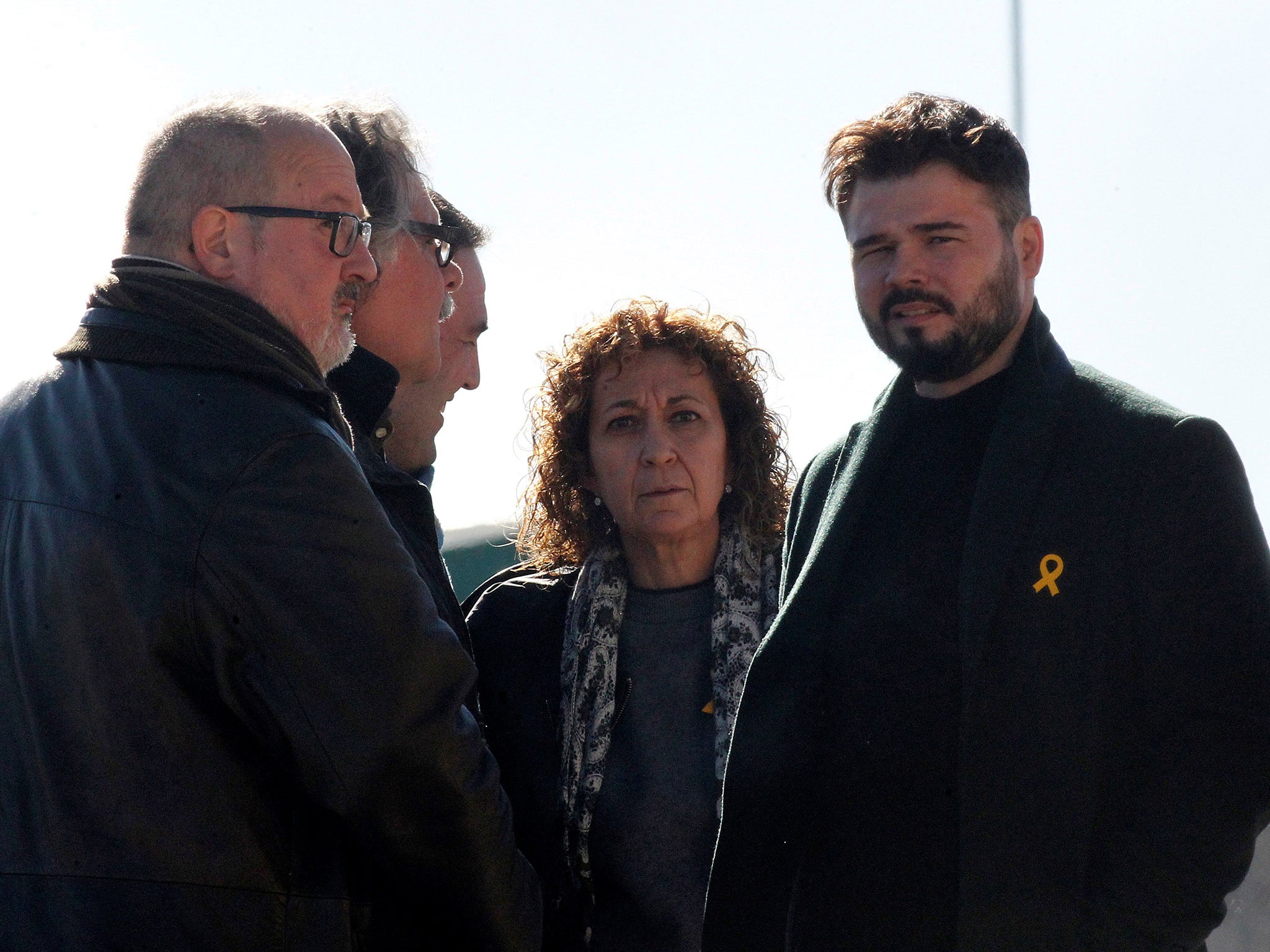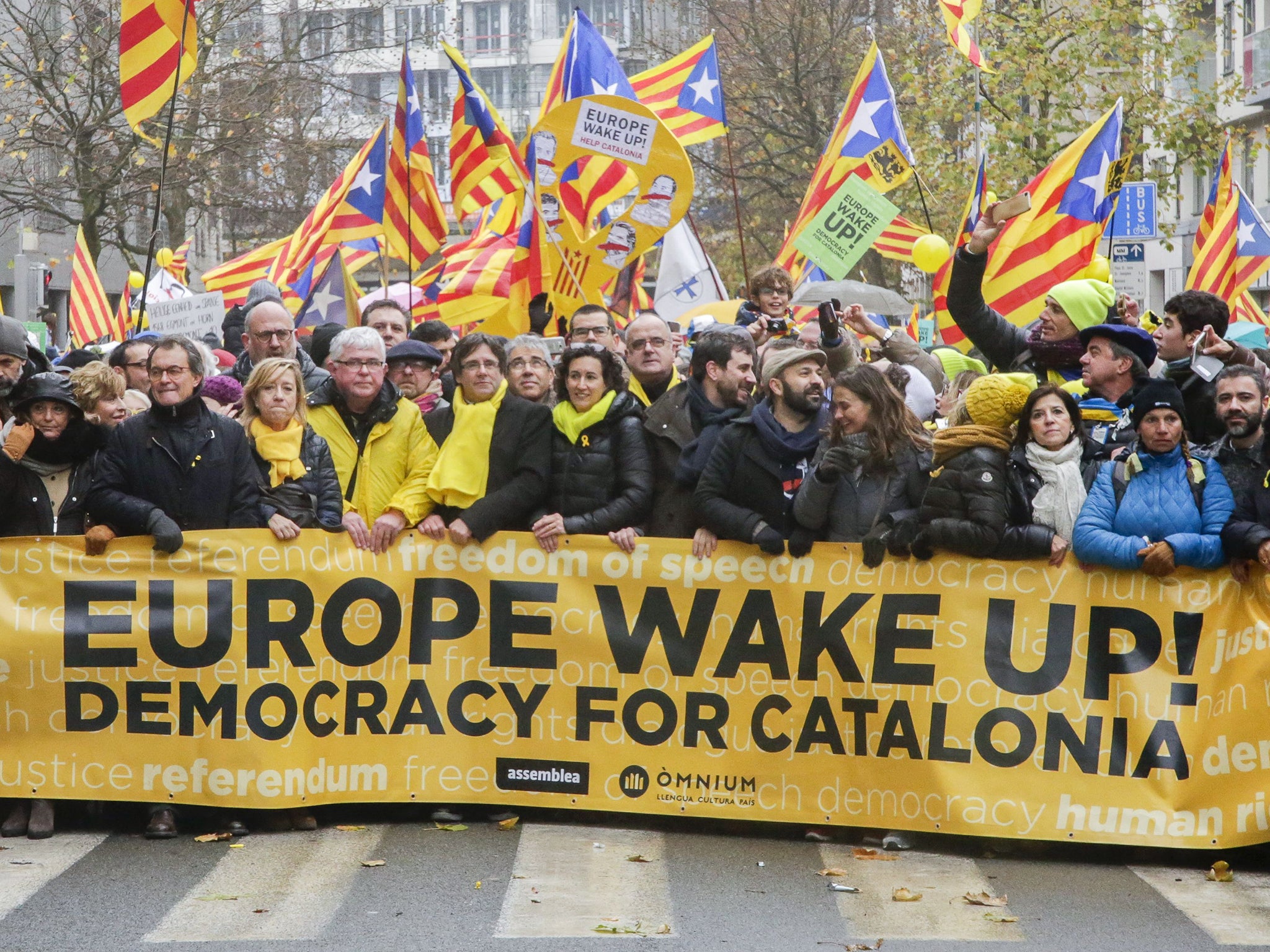Inside Catalonia's pro-independence movement: 'They beat us with sticks... we have to beat them with votes'
This week campaigning began ahead of Catalan regional elections, called by Madrid for 21 December, with key separatist leaders in either prison or exile. The Independent meets the charismatic activists and party members who still fight for independence
They have been beaten for trying to hold a referendum, their parliament has been dissolved and their leaders have either fled or been put in prison, but the Catalan independence supporters are not relenting.
This week 45,000 Catalans and their sympathisers flocked to the rainy streets of Brussels to greet their deposed former president Carles Puigdemont and take their fight to the capital of Europe. Four days before Christmas they will take it to the ballot boxes in regional elections where they aim to show they are stronger than ever.
“On the first of October they beat the crap out of us with sticks,” says Gabriel Rufian, referring to the Spanish police’s violent crackdown of the banned referendum. “On the 21st of December we have to beat the crap out of them with votes.”
Rufian, 35, is the charismatic representative for left-leaning pro-independence party Esquerra Republicana de Catalunya (ERC), which narrowly lead the polls ahead of the election.

He is their representative in the Madrid parliament, where he has carved out a reputation as a rabble rouser, a rock star who marches into the chamber wearing T-shirts with political slogans, confronting the central government with provocative speeches, holding up props – from printers to handcuffs – to bring attention to his cause of the day.
In Madrid he is derided, but in the Catalan city of Terrassa, where he packed out a hall of 300 people on the first full day of campaigning on Tuesday, he is greeted with wild cheering.
“They put our friends and colleagues in prison, our worst nightmare,” he tells the captivated crowd.
“In the polling stations we will give them their worst nightmare.”
The mood in the hall is euphoric and defiant.
“We voted on the first of October and now we have to defend our vote and defend our republic in the polling stations and this time they aren’t going to use violence against us,” says Eduard Morell, an activist for the ERC in Terrassa.

Like many Catalan independence supporters, including Manchester City manager Pep Guardiola, Rufian wears a yellow ribbon to highlight the continued imprisonment of separatist figures Oriol Junqueras, the leader of Esquerra, former interior minister Joaquin Form and civil society leaders Jordi Sanchez and Jordi Cuixart.
“They are 16 hours in cells, alongside rapists, fraudsters and thieves,” Rufian tells The Independent from the ERC’s headquarters in Barcelona.
“A few days ago they received letters from thousands of Catalans who give them encouragement and they are good despite everything and they are conscious of the situation.”
Rufian is a leading figure in Sumate, a movement of Spanish-speaking independence supporters whose motto is: “It’s not about your origin, it’s about your destiny.”
The Spanish Civil War and the 36 years of Francisco Franco’s fascist dictatorship feature heavily in his discourse.
“We we want to recover the Republic which they robbed from us 80 years ago,” he says.
“We want a country for everyone and for everything, a country that isn’t so tough on the weak. In Catalonia we’ve passed progressive laws which Spain has struck down. We don’t want a revolution, we would just like a country where we can put a tax on nuclear companies and banks. A country where in winter people don’t have to choose between buying food or putting on the heating.”
The regional elections were called by Spain’s Prime Minister Mariano Rajoy hours after the Catalan parliament made a unilateral declaration of independence on 27 October.
Rajoy, who also imposed direct rule on the region that day, has urged voters to “Recover Catalonia from the havoc of separatism”.
Almost 2,400 companies have moved their base from Catalonia since the illegal referendum, aided by the Spanish government passing a law making it easier to move their operations around the country.
Xavier Garcia Albiol, leader of Rajoy’s PP in Catalonia, has said of the 21 December elections: “The choice is simple: do you want businesses and jobs or roadblocks in the name of independence?”
According to the latest polls Esquerra will get the biggest share of the vote in the region, 20.5 per cent, narrowly leading Junts per Catalunya, the new name for the party led by Puigdemont, on 19.3 per cent.
Right behind them on 19 per cent is the pro-unionist party Ciudadanos, led in Catalonia by the telegenic Ines Arrimadas who has pledged to unravel the separatist movement if her party wins.
Separatist parties will get 45.8 per cent of the vote, according to the latest poll by newspaper El Periodico, with 43.8 per cent going to unionist parties. Catalunya En Comu, which has not declared for or against independence, has 8.5 per cent while minority parties have 2 per cent.
That gives pro-independence parties between 65-68 seats of 135 seats in total, with 68 needed for an absolute majority.
The Socialist party were way behind but have clawed their way back in the polls to tie with Ciudadanos. Socialist representative Carles Castillo is against independence but disagrees with what he says is a simplistic message from Ciudadanos and the PP.
“They are only saying no to independence but we have to construct a society,” he says.
“Catalonia has done integration well and fought to have harmony among its citizens but now we are terribly divided. I don’t want my children to live in a place divided into two blocks.”

Many independence supporters have called the elections illegitimate but a remarkable turnout of 80 per cent is expected on 21 December.
“No vote will stay at home,” says Bernat Castro, a 30-year-old political communications adviser with parents from Andalusia and Extremadura. He used to believe Catalonia could co-exist within Spain but gradually grew more and more disillusioned with the central government.
“Independence used to be associated with national sentiment, Catalan culture, language, it had a lot to do with longing for the past,” he says.
“Now people aren’t looking to the past; they think we deserve a state because the Spanish government has failed us. This is not about history, it’s about our present and future. This movement used to be romantic, now it is pragmatic.”
Castro highlights the diversity of the movement on the streets and in political parties.
Esquerra is of the centre left but appears hawkishly conservative when compared to the CUP, the anti-capitalists grassroots party often laughed at in the Spanish media for their representatives’ scruffy dress sense and haircuts.
The CUP are unlikely bedfellows with Puigdemont’s pro-business Junts per Catalunya, formerly known as the PdeCAT, but these vastly different groups have pulled together in the name of independence.
“I have seen people I used to get into furious political debates with at demonstrations in the past few months, people I thought I had nothing in common with,” Castro says.
“A phrase you keep hearing these days is ‘What’s happening today?’ Everyone wants to go on demonstrations. Even my grandmother is getting involved.”
The independence movement has also attracted people with roots from different continents. Liz Castro is from California and first came to Catalonia in 1987.
“The idea of independence back then was like the idea of going to the moon: it would be nice but it’s not possible. That’s changed hugely in the last 10 years,” she says.
“With each mass demonstration people have started to believe it’s possible.
“The investment that comes from Spain has no comparison to our population, GDP or exports, it’s unbalanced, and people who live here no matter if they come from Andalusia or the UK realise Catalonia needs to be able to choose its own future.”
Rufian believes his movement has been emboldened by the chaotic last three months, above all by the Spanish police’s actions on 1 October.
“1,000 people were injured. A boy lost an eye from a rubber bullet. And all people did was try to protect ballot boxes from police in riot gear,” he says.
“Wait and see what happens on election day because many people who weren’t for independence will now go and vote against the police’s response.
“If we win it will be a rallying cry on an international level. They said we were only four people, if we win, we’ll show them how many we really are.”
Join our commenting forum
Join thought-provoking conversations, follow other Independent readers and see their replies
Comments